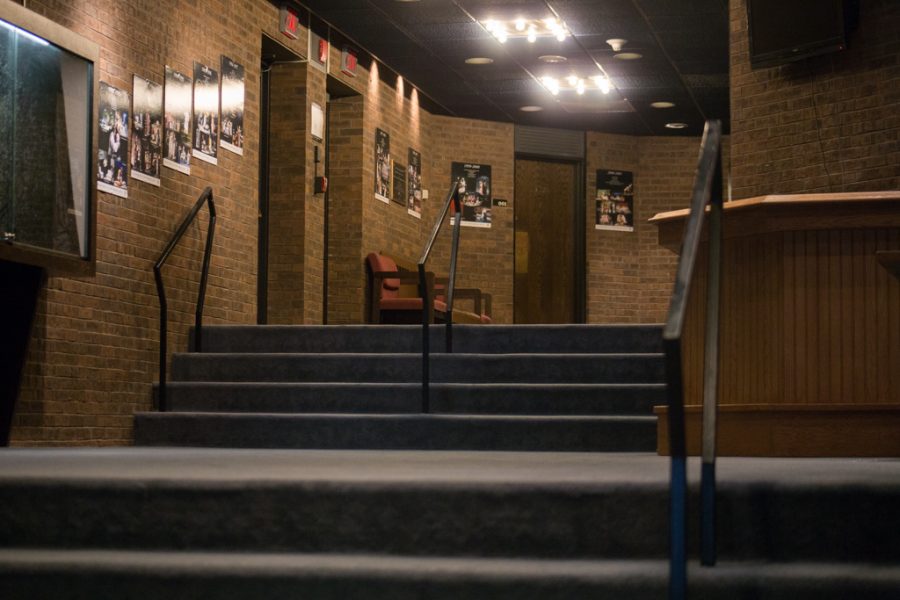“Terrible” and “angry” were the two words Chester Loeffler-Bell, the technical director for the theater department, felt best described how he felt when he was notified that his contract would not be renewed.
Marquette University announced the layoff of 39 staff and faculty Jan. 21, and has recently added that administration will not renew the contracts of a “single digit percentage” of nontenure track faculty contracts were not renewed after this semester.
Loeffler-Bell is currently in charge of teaching three courses, including stagecraft, lighting design and theatre management. Outside of the curriculum, he was also in charge of making sure all sets were built prior to a performance. Additionally, he served as a lighting designer for numerous projects.
“I am very frustrated. I’ve been at MU for 20 years. I wanted to finish my career here. Confusion is an understatement,” Loeffler-Bell said.
In response to the layoffs, Loeffler-Bell felt that the Marquette community needs to know that they are not necessary, but still acknowledged that Marquette is in a rough patch right now financially.
“MU has the resources or at the very least could have cobbled together the funds needed to keep the dedicated employees and programs going during the pandemic,” he said. ” The University for whatever reason, wrongly decided to make easy choices instead of maintaining what makes MU great. They have forgotten that you need to treat people how you want to be treated.”
The Theatre Arts program will now be condensed down to four total professors, from an original five staff members.
Devon Wiensch, a junior in the College of Communication, said they were also very frustrated by this decision.
Wiensch said that the arts don’t get a lot of money, and when things get cut, the arts get cut first.
“I was fuming. I was so mad. I was an-ga-ry with three syllables,” Wiensch said when they first found out Loeffler-Bell had been fired. “Chester is such a teddy bear. You’d think he’s like this grumpy guy, but he’s actually really sweet, and crazy talented as well. (The theater department) doesn’t deserve him really.”
Wiensch said the layoff was a surprise to many students in the theater department.
“We all woke up one morning and Chester got laid off,” Wiensch said. “I know they were thinking about closing the whole program and had to make cuts either way, but there was not any transparency about that or communication before or after he was fired.”
As technical director, Loeffler-Bell’s main job was to guide students in lighting and sound design behind the scenes of productions.
“It’s really hard to do a production to the best of your ability if you don’t have a technical director,” Wiensch said. “I am stage managing a capstone right now, and Chester’s not here, so it’s weird and there’s also (COVID-19), so who knows what theater is anymore anyway.”
Emma Knott, a junior in the College of Communication, said she attended a meeting with the dean of the College of Communication at the beginning of the semester, along with a few other theater arts students regarding the department.
“When we were in a meeting with (the dean), she kind of just said, ‘We’ll make sure to keep students in the loop, or at the very least, informed of what’s going on,'” Knott said. “So a lot of students feel that there’s been a problem with transparency coming from the people who are making these decisions.”
Knott said that Loeffler-Bell has been working at Marquette for over 20 years, but received no severance, and there was no mention of him not having his contract renewed at a recent staff meeting.
Severance pay is a package of benefits that employees are eligible to receive after being laid off. The specific amount of pay is typically dependent on the length of employment and agreement with the university or company.
“The whole university is dealing with cuts, but it just feels like such a big loss,” Knott said. “Chester is the only one who knows how to operate on everything, and he does that for every single show.”
As a student who focuses mainly on acting and performance in the theater department, Knott said she wanted to explore set design more, and that was how she originally met Loeffler-Bell. She said a lot of the work that Loeffler-Bell does actually takes place outside of the classroom.
“There was one day when I didn’t have anything to do, and he actually started teaching me a lot about set design,” Knott said.
Maaz Ahmed, a senior in the College of Communication, expressed his irritation with the university. Ahmed has had numerous experiences with Loeffler-Bell. Even beyond the classroom, Ahmed was able to gain a large amount of experience and influence from him.
Ahmed said the situation was frustrating because “future students will not be able to work with (Chester). He has had an indescribable amount of influence on my education.”
“I worry that future students will not have the same opportunities to grow within the program. They will not be able to reap the benefits that he provided in such a safe environment,” Ahmed said.
Ahmed emphasized that as a Marquette community, students must protect educators and professors. Loeffler-Bell said he has felt this kind of support from students in theatre who keep him going.
“This is the most devastating moment in my life. Seeing (theater students) every day helps a lot,” Loeffler-Bell said.
This story was written by Finn Askin, Benjamin Wells and Skyler Chun. They can both be reached at finn.askin@marquette.edu, benjamin.wells@marquette.edu & skyler.chun@marquette.edu.





Rick Singel • Apr 13, 2021 at 1:54 pm
And yet, as the university decimates the arts staff, I’ll bet the layer of administrators and bureaucrats grows thicker. Bet they all got raises and will also bet that building on campus continues. Money is plentiful if the bureaucrats like you. This entire thing is sickening.